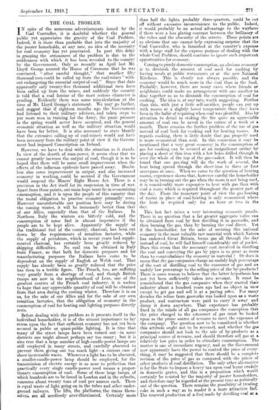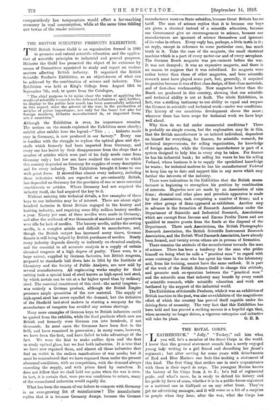THE COAL PROBLEM.
IN spite of the numerous advertisements issued by the Coal Controller, it is doubtful whether the general public yet appreciates the gravity of the Coal Problem.
Indeed, it is more than probable that into the majority of the poorer households, at any rate, no idea of the necessity for coal economy has yet penetrated. In part this delay in grasping the seriousness of the problem is due to the suddenness with which it has been revealed to the country by the Government. Only as recently as April last Mr.
Lloyd George assured the House of Commons that he was convinced, " after careful thought," that another fifty thousand men could be called up from the coal-mines "with- out endangering the essential output of coal." Since that date apparently only twenty-five thousand additional men have been called up from the mines, and suddenly the country is told that a coal famine of the most serious character is pending. Evidently there was some miscalculation at the time of Mr. Lloyd George's statement. We may go further, and suggest that if eighteen months ago the Government had listened to their military advisers, and taken steps to put more men in training for the Army, the panic pressure in the spring would never have occurred, and the general economic situation as well as the military situation would have been far better. It is also necessary to state bluntly that the extensive calling up of coal-miners would not have been necessary from the military point of view if the Govern- ment had imposed Conscription on Ireland.
However, we have to deal with the situation as it stands. In view of the dearth of man-power, it seems clear that we cannot greatly increase the output of coal, though it is to be hoped that there will be some small improvement when the effects of the influenza epidemic have passed away. Doubt- less also some improvement in output, and also increased economy in working, could be secured if the Government would suspend the Miners' Eight Hours Act. There is a provision in the Act itself for its suspension in time of war. Apart from these points, our main hope must lie in economizing consumption, and it is upon the people of this country that the moral obligation to practise economy primarily rests. However uncomfortable our position here may be during the coming winter, it will be immensely better than that of our Allies, especially than that of the Italians. In Northern Italy the winters are bitterly cold, and the consumption of some fuel is almost imperative if the people are to be kept alive. Apparently the supply of the traditional fuel of the country, charcoal, has been cut down by the requirements of munition factories, while the supply of petroleum, which in recent years had supple- mented charcoal, has certainly been greatly reduced by shipping difficulties. No coal can be obtained in Italy from France, so that both for domestic purposes and for manufacturing purposes the Italians have conic to be dependent on the supply of English or Welsh coal. That supply has already been so greatly reduced that the price has risen to a terrific figure. The French, too, are suffering very greatly from a shortage of coal, and though British troops are now in the neighbourhood of Lens, one of the greatest centres of the French coal industry, it is useless to hope that any appreciable quantity of coal will be obtained from that area during the coming winter. Therefore it is on us, for the sake of our Allies and for the sake of our own munition factories, that the obligation of economy in the consumption of coal for heating and lighting purposes directly rests.
Before dealing with the problem as it presents itself to the individual householder, it is of the utmost importance to lay stress upon the fact that sufficient economy has not yet been secured in public or quasi-public lighting. It is true that many of the street lamps have been turned out—in some districts one might almost perhaps say too many ; but it is also true that a large number of high-candle-power lamps are still employed in many streets, and carefully obscured to prevent them giving out too much light—a curious case of sheer inexcusable waste. Wherever a light has to be obscured, a smaller-candle-power lamp should be employed, for the transmission of electric energy is so near .to perfection that practically every single candle-power used means a propor- tionate consumption of coal. Some of these large lamps, of which hundreds are to be found in London and in the suburbs, consume about twenty tons of coal per annum each. There is equal waste of light going on in the tubes and other under- ground railways. The lifts, the platforms, the trains them- selve.6., are all needlessly over-illuminated. Certainly more than half the lights, probably three-quarters, could be cut off without excessive inconvenience to the public. Indeed, it would probably be an actual advantage to the wayfarer if there were a less glaring contrast between the brilliancy of the tubes and the obscurity of the streets. These points are so obvious that one cannot help expressing surprise that the Coal Controller, who is furnished at the country's expense with a large staff for the express purpose of dealing with the whole Coal Problem, should continue to ignore such important opportunities for economy.
Coming to purely domestic consumption, an obvious economy is to diminish the amount of coal used for cooking by having meals at public restaurants or at the new National Kitchens. This is clearly not always possible, and the economy would be much more in the coal than in the food. Probably, however, there are many cases where friends or neighbours could make an arrangement with one another to dine together so as to diminish the consumption of coal for cooking. The idea is, at any rate, worth suggesting. Further than this, with just a little self-sacrifice, people can put up with rooms at a slightly lower temperature than they have been in the habit of requiring when coal was plentiful. Also by attention to detail in stoking the fire quite an appreciable amount of coal can be saved in the course of a week or a month. There remains the further problem of the use of gas instead of coal both for cooking and for heating rooms. As regards cooking, there is little doubt that gas properly used is more economical than coal. In this connexion it may be mentioned that a very great economy in the consumption of gas for cooking can be secured at an insignificant outlay by placing a sheet of thin iron with a few holes drilled through it over the whole of the top of the gas-cooker. It will then be found that one gas-ring will do the work of several, the heat being .spread through the sheet-iron to three or four saucepans at once. When we conic to the question of heating rooms, experience shows that, however careful the householder may be in turning out the gas when the room is not being used, it is considerably more expensive to heat with gas than with coal a room which is required throughout the greater part of the day. From the monetary point of view the gas-heating of rooms in place of coal-heating is only economical where the heat is required only for an hour or two in the day This last fact raises a very interesting economic puzzle. There is no question that a far greater aggregate value can be obtained from coal by first distilling it in gasworks, and then burning the gas, than by burning the coal direct. Yet if the householder, for the sake of securing this national economy in the most valuable raw material with which Nature has endowed Great Britain, burns gas all through the day instead of coal, he will find himself considerably out of pocket. Does this mean that the necessary cost involved in distilling the coal and conveying the gas by pipes is so great as more than to counterbalance the economy in material ? Or does it mean that the gas companies charge an unduly high percentage of the cost of distilling coal to the consumer of gas and an unduly low percentage to the selling-price of the by-products f There is some reason to believe that the latter hypothesis has not yet been sufficiently taken into account. It must be remembered that the gas companies when they started their industry about a hundred years ago had no object in view except to get gas and sell it at a paying price. For many decades the refuse from gasworks was looked upon as a waste product, and contractors were paid to carry it away and dump it down anywhere. That experience has probably fixed in the minds of all gas companies the conception that the price charged to the consumer of gas must be looked upon as the prime source of revenue to meet the expenses of the company. The question now to be considered is whether this attitude ought not to be reversed, and whether the gas companies should not look to the sale of by-products as a principal source of revenue, and should therefore sell gas at a relatively low price in order to stimulate consumption. The matter is one of immediate urgency, and as the Government now apparently have the power to control the price of every- thing, it may be suggested that there should be a complete revision of the price of gas as compared with the prices of other products of coal distillation. The only other alternative is for the State to impose a heavy tax upon coal barnt crudely in domestic grates, and this is a proposition which would certainly be resisted by the majority of poorer householders, and therefore may be regarded at the present time as politically out of the question. There remains the possibility of treating coke in such a way. as to render it a more attractive fuel The renewed production of a fuel made by distilling coal at a comparatively low temperature would effect a far-reaching economy in coal consumption, while at the same time ridding our towns of the smoke nuisance.



























 Previous page
Previous page